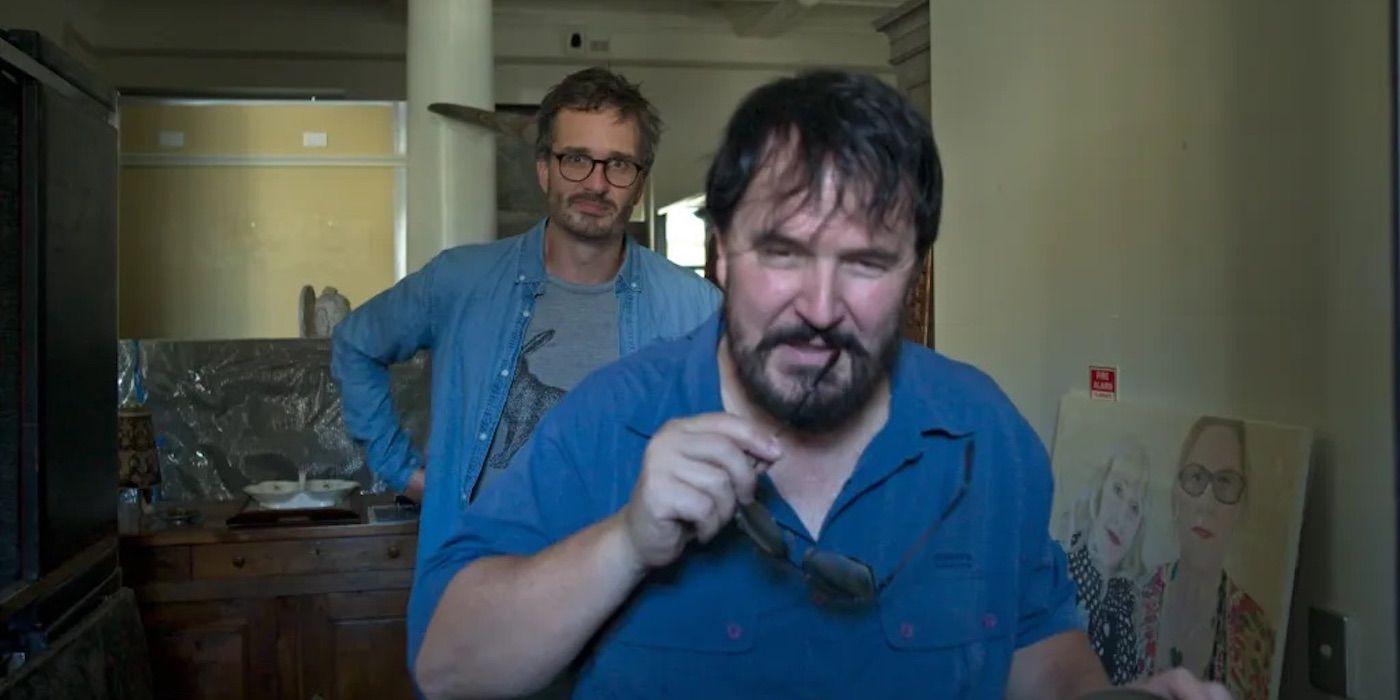David Farrier, a New Zealand journalist with a nose for the bizarre, came to mainstream attention with the documentary Tickled, which starts as an investigation of “competitive tickling” videos and ends up exposing a global, decades-long extortion operation forcing boys into making fetish content. It’s one of the more memorable documentaries of the digital age, earning Farrier a reputation as the “dark underbelly” guy, including a Netflix show where he traveled to morbid or dangerous tourist destinations (Dark Tourist, for those curious). But in Mister Organ, his second feature documentary, Farrier dives into the deepest pit of all: the human psyche.
READ ALSO: Read all of Ryan Bordow’s movie reviews here
Well, one particular human psyche: that of Michael Organ, a security worker at an Auckland antique shop. Organ and the shop’s owner, one Jillian Bashford-Evans, drummed up complaints in 2016 over their predatory parking fees: anyone who left their car in the lot without giving the store business, even for a second or two, was subject to an instant wheel clamp and a hefty charge, often upwards of hundreds of dollars. Farrier reported on the scheme until the antique store finally closed, but to security thug Michael Organ, that was an open act of war. He takes Farrier to court, attacks him on talk radio, and maybe sneaks into his home(!), urging Farrier to play detective against this would-be nemesis.
Turns out Organ has a colorful past: foiled yacht thief, pretender to royalty, the unforgettable bane of several roommates’ existences. The film reveals the depths of his transgressions with Tickled’s taste for escalation—the story gets weirder and darker as it goes, tracing Organ’s path of destruction through various lies and victims. It’s compelling on a base level, but it feels a bit icky for a documentary: if some bully targets a journalist, do they deserve an inquest into their past screened in theaters nationwide? Farrier has zeroed in on one man before—the kink empire of Tickled was run by a single wealthy pervert—but he was the figure at the end of the breadcrumb trail; here, Farrier starts with the man and dredges up the crumbs. For every lurid revelation, as shocking as they are, I couldn’t help but feel a twinge of media ethics trespass.
And the standard documentary format doesn’t make that feel worthwhile. For its first half hour, the film settles into a rhythm that’s not especially revelatory: another interview with someone Organ hurt, some shots of the subject’s living space to flesh out their context, more narration from Farrier pondering Organ’s pathologies with the measured enunciation of a reporter. A dark color grade and emphasis on shadows (sometimes necessitated by hidden cameras in the dark) lend the film a somber tone, but we don’t learn anything new about the average manipulative git. The inquest seems to be spinning its wheels—until Michael Organ sits down for an interview.
It’s at this point that the documentary finds its shape. In concert with the compounding tales of Organ’s manipulation, his participation in the film unveils a snapshot of a narcissist: a man who hates invasion of privacy but loves himself on camera, who thrives on abuse and intimidation while framing himself in the right, who’s mastered the art of eluding responsibility but wants the world to know the genius of his crimes. This push-and-pull between a malignant narcissist and a detective with a camera is fascinating. For one, the more we learn about Organ, the less dodgy it feels to dig up his skeletons—the man is a public menace, and documenting his schemes is practically a public service. It becomes grimly clear that Jillian, the owner of the now-defunct antique shop, is just the latest mark that Organ has latched onto, and others need to know there’s a monster about.
Even more effectively, the inability of documentary to explore this depth of narcissism becomes the thrustof the film itself. Organ’s interest in the documentary spirals into obsession: he calls Farrier repeatedly to rant for minutes on end, bloviating about his innocence and bending narratives to his favor through sheer verbal overwhelm. It’s funny, in a way—Organ is an absurd flavor of sociopath—but Farrier’s exhaustion with his subject is palpable. By the time Mister Organ is an hour in, Farrier has spent years on the man, and his standard doc structure still hasn’t “solved” the average manipulative git. Interviews with Organ’s parents? They (understandably) remain private. More stories of Organ’s sins? We expect them of him by now. What can a journalist do? What can anyone do with a pathological liar?
Mister Organ spirals into futility, but it knows it does, and that’s what makes it haunting. It’s a self-consciously compromised portrait of an impossible person—a film that allows the parasite to feed so you can feel it vicariously. It veers from its best instincts in search of a final takeaway—Farrier summarizes his thoughts with a dissonant neatness—but the film’s best instincts make the lasting impression. If you’ve met your own Mister Organ, prepare to have war flashbacks.
★★★½ (3.5/5)




